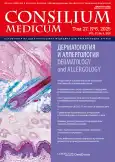Respiratory infections and psoriasis: Relationship and clinical aspects. Case report
- Authors: Katkova K.V.1,2, Denisova E.V.1,2, Korsunskaya I.M.1,2
-
Affiliations:
- Center for Theoretical Problems of Physicochemical Pharmacology
- Moscow Scientific and Practical Center of Dermatovenereology and Cosmetology
- Issue: Vol 27, No 6 (2025): Dermatology and allergology
- Pages: 366-368
- Section: Articles
- URL: https://bakhtiniada.ru/2075-1753/article/view/309793
- DOI: https://doi.org/10.26442/20751753.2025.6.203310
- ID: 309793
Cite item
Full Text
Abstract
Respiratory infections are among the most common infectious diseases. The influenza epidemic and the coronavirus pandemic have demonstrated how quickly respiratory diseases can spread, causing serious social and economic consequences. Respiratory infections have multiple effects on various parts of the immune system; they can aggravate chronic diseases and contribute to the exacerbation or onset of autoimmune diseases, including skin conditions. Any infectious process activates the immune system, triggering an inflammatory response. In autoimmune diseases, such as psoriasis, the immune system is already overactive, and additional stimulation can lead to increased inflammation in the skin and exacerbation of symptoms. Induction of psoriasis guttata was previously described only by a tonsil infection caused by Streptococcus pyogenes. Currently, evidence has been accumulated on the effect of various viral infections, including SARS-CoV-2, on the course of psoriasis. Cases of the onset of psoriasis guttata and common plaque psoriasis, which is resistant to topical therapy after coronavirus infection, have been reported. A clinically significant problem is the exacerbation of psoriasis and its transformation into more severe and resistant forms. Given the presence of comorbidities in most patients, it is necessary to develop an individual approach to achieve the key goals of a modern therapeutic approach – its maximum effectiveness and safety. The article presents a literature review and a clinical case demonstrating the torpid course of psoriasis with onset after a coronavirus infection.
Keywords
Full Text
##article.viewOnOriginalSite##About the authors
Ksenia V. Katkova
Center for Theoretical Problems of Physicochemical Pharmacology; Moscow Scientific and Practical Center of Dermatovenereology and Cosmetology
Email: marykor@bk.ru
ORCID iD: 0000-0002-7794-489X
Res. Assist.
Russian Federation, Moscow; MoscowElena V. Denisova
Center for Theoretical Problems of Physicochemical Pharmacology; Moscow Scientific and Practical Center of Dermatovenereology and Cosmetology
Email: marykor@bk.ru
ORCID iD: 0000-0002-4887-284X
Cand. Sci. (Med.)
Russian Federation, Moscow; MoscowIrina M. Korsunskaya
Center for Theoretical Problems of Physicochemical Pharmacology; Moscow Scientific and Practical Center of Dermatovenereology and Cosmetology
Author for correspondence.
Email: marykor@bk.ru
ORCID iD: 0000-0002-6583-0318
D. Sci. (Med.), Prof.
Russian Federation, Moscow; MoscowReferences
- Zhu H, Lou F, Yin Q, et al. RIG-I antiviral signaling drives interleukin-23 production and psoriasis-like skin disease. EMBO Mol Med. 2017;9(5):589-604. doi: 10.15252/emmm.201607027
- Rychik KM, Yousefzadeh N, Glass AT. Guttate psoriasis following presumed coxsackievirus A. Cutis. 2019;104(4):248-9.
- Lionel Fry, Barbara S. Baker, Triggering psoriasis: the role of infections and medications. Clin Dermatol. 2007;25(6):606-15.
- Sbidian E, Madrange M, Viguier M, et al. Respiratory virus infection triggers acute psoriasis flares across different clinical subtypes and genetic backgrounds. Br J Dermatol. 2019;181(6):1304-6. doi: 10.1111/bjd.18203
- Rouai M, Rabhi F, Mansouri N, et al. New-onset guttate psoriasis secondary to COVID-19. Clin Case Rep. 2021;9(7):e04542. doi: 10.1002/ccr3.4542
- Demiri J, Abdo M, Tsianakas A. Erythroderme Psoriasis nach COVID-19-Erkrankung [Erythrodermic psoriasis after COVID-19]. Hautarzt. 2022;73(2):156-9. doi: 10.1007/s00105-021-04931-0
- Ali Khan Q, Khan T, Anthony MR, et al. An Erythrodermic Psoriasis Flare-Up With Staphylococcus Bacteremia Secondary to COVID-19 Infection: A Case Report. Cureus. 2023;15(3):e36418. doi: 10.7759/cureus.36418
- Shahidi Dadras M, Diab R, Ahadi M, Abdollahimajd F. Generalized pustular psoriasis following COVID-19. Dermatol Ther. 2021;34(1):e14595. doi: 10.1111/dth.14595
- Miladi R, Janbakhsh A, Babazadeh A, et al. Pustular psoriasis flare-up in a patient with COVID-19. J Cosmet Dermatol. 2021;20(11):3364-8. doi: 10.1111/jocd.14508
- Narang T, Sharma A, Bhandari A, et al. SARS-CoV-19 and Generalised Pustular Psoriasis: A Lethal Combination. Indian J Dermatol. 2023;68(6):726. doi: 10.4103/ijd.ijd_914_22
- Murdock BN, Lowe JB, Yoo MJ. Post-COVID-19 rash: An atypical manifestation of guttate psoriasis. Am J Emerg Med. 2024;76:271.e1-3. doi: 10.1016/j.ajem.2023.12.008
- Каткова К.В., Плиева К.Т., Денисова Е.В., и др. Влияние коронавирусной инфекции на течение псориаза. Медицинский совет. 2021;12:332-8 [Katkova KV, Plieva KT, Denisova EV, Zhukova OV, Volnukhin AV, Korsunskaya IM. Influence of coronavirus infection on the course of psoriasis. Medical Council. 2021;(12):332-8 (in Russian)]. doi: 10.21518/2079- 701X-2021-12-332-338
- Ozaras R, Berk A, Ucar DH, et al. Covid-19 and exacerbation of psoriasis. Dermatol Ther. 2020;33(4):e13632. doi: 10.1111/dth.13632
- Low RN, Low RJ, Akrami A. A review of cytokine-based pathophysiology of Long COVID symptoms. Front Med (Lausanne). 2023;10:1011936. doi: 10.3389/fmed.2023.1011936
Supplementary files







